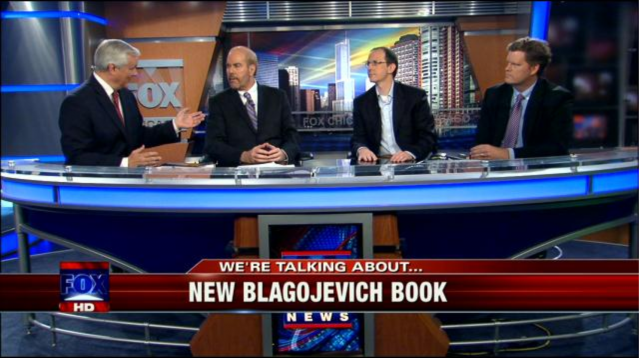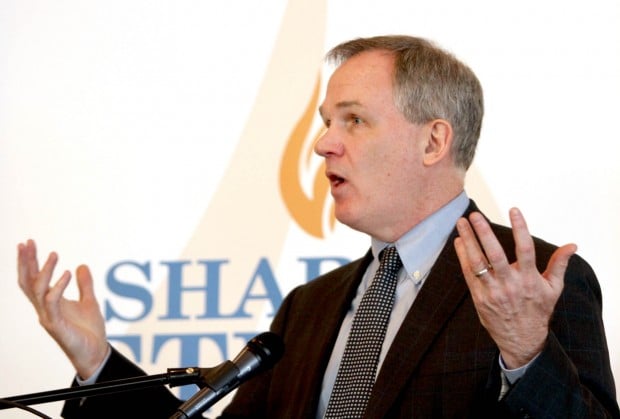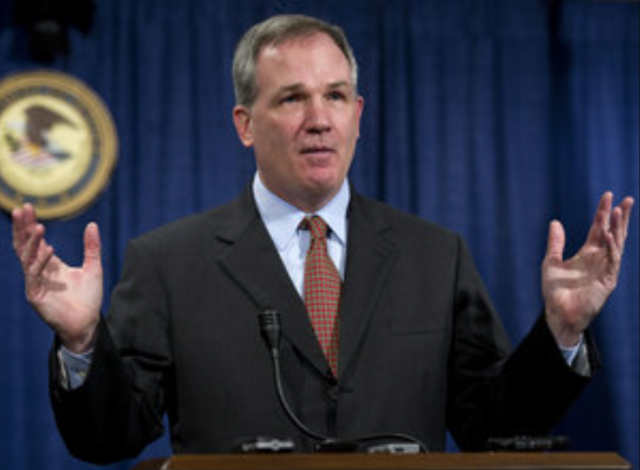Chicago Tribune reporter Jeff Coen’s own personal “Tell-Tale Heart” got him arrested
Ernie Souchak, Editor-in-Chief
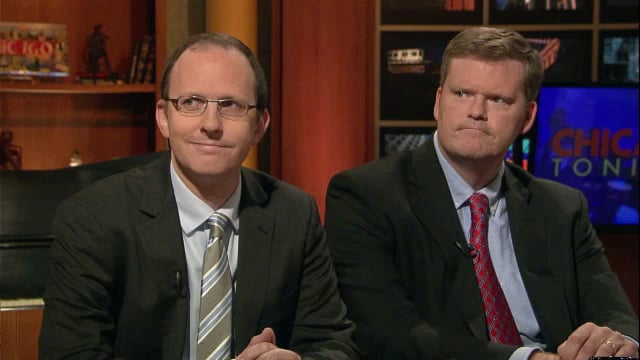
The recent arrest of Chicago Tribune reporter Jeff Coen for deliberately causing $1,500 worth of damage to a CTA train has many asking: Why?
What makes a 43-year-old "adult" do such a bizarre thing?
We at IP2P have every reason to believe the answer is very simple: it's a cry for help. Coen is experiencing his own version of the ageless Edger Allen Poe classic "Tell-Tale Heart" and it is taking its toll on him.
You see, Coen is living a big lie, and he fears his secret will soon be fully exposed.
Coen's troubles started when he agreed to fabricate stories surrounding the Blagojevich investigation and consequent trials.
Remember, Coen was the co-author of the article used as an excuse to warn Rod Blagojevich that his friend and former chief-of-staff, John Wyma, was cooperating with the feds and that Blagojevich was being recorded.
From there, Coen sought to cash in on lies he was asked to tell by telling even bigger whoppers in a book.
You might remember that work of fiction: "Golden". You know, the one in which Coen and his co-author, John Chase, claimed they had copies of all the Blagojevich wiretap recordings and that they had listened to all of the them.
Well as those lies have begun to unravel, so has Jeffrey.
The thought of being exposed for writing a book filled with lies has been weighing heavily on Coen's mind. (We know this for a fact. ) And there is a real possibility that Coen has come to realize that being exposed as a habitual liar is inevitable.
The fear of being found out resulted in Coen's obvious mental breakdown, causing him to go ballistic on a CTA train.
Let's all hope that Jeff accepts the counseling that has been offered to him, and heeds the wisdom of another ageless classic, "The truth will set you free", before it is too late and he seriously hurts someone.
Jeff, we hear your cry for help. Now just tell the truth...
Human Behavior Consultant Virginia Clemm Contributed
To Trib Editor Gerould Kern: Tear down this wall…
Thomas Barton, Investigative reporter

Chicago Tribune reporters John Chase and Jeff Coen say the Feds gave them access to the Blagojevich wiretap tapes and transcripts they used in writing their book entitled “Golden.”
This access was granted to them when the material was under seal and unavailable to anyone else, in or out of the media.
IP2P has learned that Coen has made another claim – one that takes the cozy relationship between the Tribune and the Feds to a whole new level. Remember, the Feds initially leaked information to the Tribune about the existence of the Fed’s wiretap on Blago.
When asked about the sealed Blagojevich tapes and transcripts that the Feds shared with the two reporters for their book, Coen replied that the leaked material was “the Tribune's business.” He refused to elaborate.
In other words, talk to my boss. So we’ve talked to Coen’s boss.
Tribune Editor Gerould Kern was asked why the Trib has failed to share the tapes and transcripts with its readers.
Kern will not respond.
We call upon the Chicago Tribune to inform its readers and publish the transcripts. After all, they represent news, and the paper is supposed to be in the news business.
There is no legal ban on printing the material. Chase and Coen have already referred to tapes in their book. But there they only quoted material from inane conversations with little news value to Chicagoans.
In other words, they teased their readers, but didn’t inform them.
So to Gerould Kern we say: Tear down this wall that hides the Blagojevich tapes.
Chicago Review Press: Do they ignore the facts?
Ernie Souchak, Editor-in-Chief

Since the release of the book "Golden," by authors and Chicago Tribune reporters John Chase and Jeff Coen, serious questions have been raised about the honesty of the book's claims.
IP2P has received information from several sources that lead us to conclude this: Someone is not telling the truth about the claims made in the Chicago Review Press publication.
These public assertions lead us to that conclusion:
(1) The man who warned Rod Blagojevich that the feds were recording him, Tribune reporter John Chase, was a co-author of the book.
(2) Chase and Coen claim, in their book, to have listened to, and read, the transcripts of all the Blagojevich wiretaps...that have never been made public.
(3) The U.S. Attorney's Office insists the wiretap tapes and transcripts were provided to no one - including Chase and Coen. Even though Chase and Coen insist that the USAO did provide the material.
(4) Prior to Chicago Review Press publishing "Golden," a credible source made attempts to provide important information to the publisher that would have helped insure that their book was factual.
U.S. Attorney's Office claims author's of Blagojevich book "Golden" lying
(5) To date, Cynthia Sherry and the Chicago Review Press have refused to answer basic questions that a publisher should expect from the media: (A) Did Chicago Review Press fact-check the book they published as non-fiction? (B) Did the authors actually have access to the tapes and transcripts of the Blagojevich wiretaps that were not made public?
From: (Redacted)
To: csherry
Sent: 2013-02-01 21:00:02 +0000
Subject: Fwd: Publishing False Information
Ms. Cynthia Sherry
Did The Chicago Review Press verify that John Chase and Jeff Coen actually possessed and listened to all the Blagojevich wiretap tape recordings and read transcripts that were never made public, per their claim in the book you published titled "Golden" ?
If you did verify, please explain how.
(Name redacted)
-----Original Message-----
From: (Redacted)
To: csherry
Sent: 2012-12-08 23:15:43 +0000
Subject: Publishing False Information
Ms. Cynthia Sherry
The U.S. Attorney's Office Northern Dist. of Illinois has just gone on the record saying that John Chase and Jeff Coen are not telling the truth about having access to tapes a transcripts of the Blagojevich wiretaps that were never made public.
Ms. Sherry, as publisher of Chase and Coen's book "Golden" you can clearly understand the ramifications if this is true.
Did Chase and Coen publish false information? The USAO says yes.
Ms. Sherry, what do you say?
(Name redacted)
All of this begs the question: Was Chicago Review Press so concerned with telling the authors' version of the Blagojevich story that they ignored the facts?
Listen to Cynthia Sherry explain Chicago Review Press promotion of progressive writings and social justice.
http://www.c-spanvideo.org/program/299785-1
At IP2P we ask this: Did the truth about the Blagojevich case not work for their progressive agenda?
More on this soon............
Hey Chicago Tribune, what kinda Journalism is that?
Ernie Souchak, Editor-in-Chief
The traditional rules of journalism apparently don't apply to the Chicago Tribune. Now it's the rules of "Forward Journalism" that they follow.
For example:
Basic rule #1 - When you get the inside scoop on a wiretap the government's running on a sitting governor, you don't make a decision at 10:20 p.m. to derail the government's investigation, while, at the same time, flushing the biggest news story of the year down the drain with a John Chase phone call warning Gov. Blagojevich that the feds are listening.
Unless you "report" for the Chicago Tribune.
Basic rule # 2 - When you write the self-described definitive book about the Rod Blagojevich affair, as reporters John Chase and Jeff Coen claim to have, and the U.S. Attorney's office publicly takes issue with the honesty of your claims, you back up your story with evidence that supports your words.
Unless you work for the Chicago Tribune
Basic rule #3 - When the honesty of reporters is challenged by the U.S. government, the Editor stands by his or her reporters, or excepts responsibility for their mistakes and makes the appropriate changes to protect the integrity of the newspaper.
Unless you're an Editor at the Chicago Tribune.
Ever since the U.S. Attorney's Office of the Northern District of Illinois went on the record disputing claims made by Chase and Coen, the two Tribune reporters have been mute, refusing to comment.
Not only are they not responding to troubling accusations from the USAO, Tribune editor Gerould Kern, and the publisher of "Golden," the Chicago Review Press, are, also, hunkered down refusing to comment.
So is that the new style of "Forward Journalism"?
We, at IP2P, subscribe to the American traditional rules of journalism. We call for honest answers from the Tribune, on behalf of the citizens of Chicago, and Illinois.
They deserve the truth
U.S. Attorney’s Office claims author’s of Blagojevich book “Golden” lying
Ernie Souchak, Editor-in-Chief
Comments from the spokesperson at the U.S. Attorneys Office (USAO) of the Northern District of Illinois take the position that Chicago Tribune reporters John Chase and Jeff Coen are lying about their special access to wiretap tapes and transcripts from the Blagojevich investigation - tapes and transcripts that were never made public.
The USAO refuses to comment on whether or not the Chicago Tribune was given advance notice of Blagojevich's arrest.
So, why are Chase and Coen making false claims about their access to the Blago files?
Not only is the USAO disputing Chase and Coen's depiction of their exclusive access to evidence, IP2P has received evidence that Chicago Review Press, the publisher of "Golden," was cautioned to be diligent in their pre-publishing fact-checking of the reporters' book.
All indications are that the publishing company did not thoroughly fact-check the book. We wonder: Why that didn't happen?
Unfortunately, Chicago Review Press spokesperson, Cynthia Sherry, was unavailable for comment
____________________________________________________________________________________
-----Original Message-----
From: (Redacted)
To: csherry
Cc: jen
Sent: 2012-08-19 19:19:54 +0000
Subject:Fwd: Fact check "Golden: How Rod Blagojevich Talked Himself Out of the Governor's Office and Into Prison,"
Ms. Cynthia Sherry
As a person of considerable first hand knowledge concerning John Chase's and the Chicago Tribune's role in the investigation and trials of Rod Blagojevich and Tony Rezko. Knowledge including but not limited to John Chase's and the Tribune's cooperation with the U.S. Attorney and their intentional distortion of the facts in their newspaper. I extend to you my offer below.
(Name redacted)
-----Original Message-----
From: (Redacted)
To: sbetz
Cc: daisybuchman, jen
Sent: 2012-08-15 16:10:36 +0000
Subject: Fact check "Golden: How Rod Blagojevich Talked Himself Out of the Governor's Office and Into Prison,"
Sue
My offer to fact check the Jeff Coen and John Chase book "Golden: How Rod Blagojevich Talked Himself Out of the Governor's Office and Into Prison," still stands. As we discussed, you do not want to put yourself in a position of publishing false information when verification from someone who has first hand knowledge is readily available to you. If you get me an advanced copy of the book to review, it may save both Chicago Review press and IPG a great deal of embarrassment.
(Name redacted)
----- Forwarded Message -----
From: (Redacted)
To:sbetz,daisybuchman
Sent:Sun Apr 3 06:35:58 UTC 2011
Subject: Chicago Review Press clients John Chase and Jeff Coen
Sue
I will follow up with you on the discussion we had, and provide you with more details soon. I hope the inside information I provided helps you. If you have any question feel free to call me.
(Name redacted)
----- Forwarded Message -----
From: (Redacted)
To: "Jen Wisnowski"
Sent: Wednesday, March 30, 2011 2:58:03 PM
Subject: Fwd: Jeff Coen on Blago (Attention Jen Wisnowski )
Jen,
I think you might be missing the larger picture here, perhaps this email below will help you understand the gravity of the agreement John Chase and Jeff Coen have entered into with you and Independent Publishers Group. While I do not know the particulars of your contract, I feel confident it is that I can help you. I believe It will be very difficult if not impossible for Jeff Coen or John Chase to deliver a book based on the facts, due to legal reason's. Jen, perhaps this should be of concern for IPG? Please advise
(Name redacted)
From: (Redacted)
To: Chase, John
Sent: Thu Dec 17 20:10:27 2009
Subject: The Chicago Tribune
John
do you have any comments
(Name redacted)
To whom it may concern John Thomas was a mole for the FBI in the case in Illinois against Tony Rezko and others. The Chicago Tribune was aware of the fact and chose not to write a story about him at the behest of Patrick Fitzgerald (U.S Attorney Northern Dist IL). The Tribune eventually wrote a story about John Thomas, however the story they wrote was not accurate. My source at the Chicago Tribune claims that when Patrick Fiztgerald asked the Chicago Tribune to sit on the Thomas story, claiming it could put his life in danger, the Chicago Tribune refused. The Chicago Tribune told Mr Fitzgerald that they were going to run the story anyway. It was only when Patrick Fitzgerald told the Chicago Tribune that if they ran the story that it would affect the Presidential election did the Chicago Tribune agree not to run the story. My source at the Chicago Tribune confirmed this meant Obama. My source also informed me of other information that would be of interest to the people of Illinois that was not being reported in the Chicago Tribune.
----- Original Message -----
From: "Jen Wisnowski"
To: (Redacted)
Sent: Wednesday, March 30, 2011 1:00:00 PM
Subject: RE: Jeff Coen on Blago (Attention Jen Wisnowski )
Hi, (Name redacted), Thank you for your email. Sorry to have missed your phone call earlier today; unfortunately a few meetings have kept meaway from my desk today, but our customer service department let me know youcalled. At this point, I'm afraid I can be oflittle help as we don't have any materials at this stage. But please feel freeto get in touch with Jeff Coen and John Chase directly about it.
Thanks again, Jen
Jen Wisnowski
Publicity Manager
Independent Publishers Group
814 N. Franklin St.
Chicago, IL 60610
312.337.0747 ext. 227
312.337.1807 faxwww.ipgbook.com
Expert distribution services for innovative publishers
From: (Redacted)
Sent: Tuesday, March 29, 2011 1:01PM
To: Jen Wisnowski
Subject:Fwd: Jeff Coen on Blago(Attention Jen Wisnowski )
Jen,
As we discussed, not only would you like them to submit a book that is worth reading, it is important that it is accurate.That is where I can help you.
(Name redacted)
----- Forwarded Message -----
From: (Redacted)
To: "Jeff Coen" <JCoen@tribune.com>
Sent: Monday, March 28, 2011 2:07:19 PM
Subject: Jeff Coen on Blago
Jeff,
How is the Blagojevich book that you are writing with John Chase coming? Have you figured out how you are going to get around the sticky problem below, and the problem the Tribune's involvement in the John Thomas scandal presents for you, as well as all the other obstacles we discussed? My offer to help still stands, please advise.
(Name Redacted)
-----Forwarded Message -----
From: (Redacted)
To: "John Chase" <jchase@tribune.com>
Cc: "Gerould Kern" <gkern@tribune.com>, "John Kass" <jskass@tribune.com>,"Eric Zorn" <ericzorn@gmail.com>
Sent: Saturday, March 26, 2011 7:02:15 PM
Subject: Our most recent conversation 3/25/11
John,
Recapping our conversation yesterday, I want to give you yet another opportunity to answer the following questions. (1) Who informed you that the FBI was recording Rod Blagojevich, and when were you informed? (2) Who informed you that John Wyma was cooperating with the U.S. Attorney's Office and when were you informed? John, you expressed in our conversation yesterday that you will not reveal your source involving the recordings and John Wyma's co-operation. Furthermore, you informed me that I can speak to the Chicago Tribune attorney's about this issue, and that you already have spoken to them regarding this issue. Your stated position is that this is a first amendment case, and I would have to take you to court. John, as we discussed yesterday a crime was committed by the person or persons that leaked this information that originated within the U.S.D.O.J., and was under seal. Ultimately, you will not have the protection of our 1st amendment in this case. Perhaps you should familiarize yourself with Patrick Fitzgerald's opinion on the subject as it related to one of your colleagues, Judith Miller (New York Times Reporter) If your position has not changed, please let me know the names and contact information of the attorney's that you consulted with at the Tribune, so that they may be contacted.
(Name Redacted)
cc Gerould Kern
“Golden,” the whitewashing of a Department of Justice crime spree
Ernie Souchak, Editor-in-Chief, Illinois PayToPlay & Hugo Floriani, Investigative Reporter
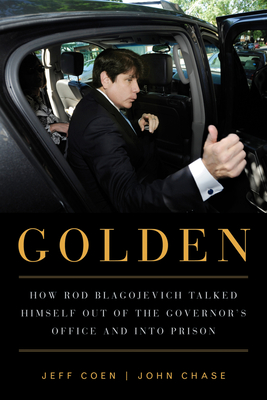
Chicago Tribune reporters Jeff Coen and John Chase wrote a 486-pages book that packs tedious and mundane details about former Illinois Governor Rod Blagojevich’s life, from birth to prison, around one key chapter that documents the role of former U.S. Attorney Patrick Fitzgerald in leaking information about his investigation of the ex-governor known nationwide as “Blago”.
The whitewash begins on the second page of the foreword entitled “Authors’ Note”: “We quote heavily from the recordings that federal agents made on phones used by the governor and others. All of those quotes come from transcripts of those phone conversations or the recordings themselves. We are grateful to those who provided case material that was outside of the public record.” (For ease of reading, we will italicize all quotations from the book.)
Those persons “who provided case material that was outside of the public record” remain unidentified throughout the book. But it soon becomes clear where they worked.
In an article written by Ernie Souchak posted on this website last September 14, we noted how the judge’s protective order, covering the transcripts of Blago’s phone conversations, stipulated that nothing prohibited Blago and his lawyers from telling his version of those recorded conversations. Blago and his attorneys were, though, ordered not to disseminate the transcripts that the feds gave them. Only the feds had permission to do that.
So, apparently, Coen/Chase secured those transcripts and recordings mentioned in the “Authors’ Note” from the feds. Here’s a question: Why was the information given to them?
Hold that thought.
The problem for the book’s core narrative – the arrest, trial and conviction of Blago – unfolds in Chapter 14 (pp. 257-295) entitled “I’ve got this thing…”
Background
On October 16, 2011, we concluded a ten-article series concerning U.S. Attorney Patrick Fitzgerald, which first posted here in on September 19, 2011, with this summary:
“So, what are the facts and circumstances that we know that collectively tend to prove, or sustain by their consistency…the hypothesis that Patrick Fitzgerald is a politically-driven, not jurisprudence-driven, prosecutor whose image as an intrepid, unbiased crime fighter is a media-created fabrication?
Here are a few headlines from Parts 1-9:
Fitzgerald acknowledged that someone leaked information to the Chicago Tribune, via a reporter for the Chicago Tribune, while the reporter, John Chase, sat mute in the front row of the news conference where the arrest of Blago was described as an effort to stop a crime spree. (Chase has told a source known to this writer that he would not identify who leaked him the information on First Amendment grounds.)
In fact, (1) Blago’s crime spree had, with Fitzgerald’s knowledge, been going on for several years. (2) Chase has not been called to account for tipping off Blago that his conversations were being recorded by the feds. (3) Eric Holder’s Department of Selective Justice has taken no steps – like that taken by Fitzgerald when he jailed Judith Miller of the New York Times in the Valerie Plame Case – to force Chase to reveal the source of the leak. And, (4) Fitz’s demeanor in discussing the leak in a press conference can be accurately described as disinterested.
The urgency to arrest Blago was manufactured out of whole cloth. The leak had to originate out of the DoJ. And, the closest outlet for the DoJ to the Chicago Tribune is Fitzgerald’s office. You connect the dots.
In retrospect, we know now that Richard Armitage was the confessed leaker in the Valerie Plame Case. We also know that Fitzgerald knew of Armitage’s confession before undertaking a long and costly investigation that convicted a key staff member of Vice President Cheney of a crime not connected to the Plame leak. And, that this media event, upon which the foundation of the Untouchable myth was built by the main stream media, was politically-driven.
The Plame “investigation” boiled down to a surrogate WWF-like wrestling match between two Big Beltway Boys: Armitage representing Powell – Libby for Cheney. With Fitzgerald as the biased referee. And, it will be so chronicled by unbiased historians in the future.
The arrest of Blago was timed, not to stop a crime spree, or the selling of a Senate seat – since the latter notion is built on the myth that, once Blago got paid for appointing someone, the act was immediate and irrevocable. The arrest was timed to save Congressmen Jesse Jackson, Jr., from criminal prosecution for bribing a governor in order to receive a Senate appointment. Connect the dots. It was about saving J.J., Junior.”
Chapter 14 – The Whitewash
The narrative here is significant, not just for what it reveals, but more for what it conceals.
The authors do not reveal the source for the information that Chase telephonically conveyed to Blago’s Spokesman, Lucio Guerrero, at approximately 10:30 p.m., Friday, December 4, 2008, namely, that the feds were listening in on Blago’s phone conversations.
Consequently, this question remains unanswered: Who leaked the information that Blago’s phone conversations were being wiretapped by the feds to the Tribune and Chase? Plus, why was that revelation leaked to the paper?
Then, why did Fitzgerald show no interest in tracking down the leaker?
We’re no closer today to answers to those questions after the 486 pages of whitewash.
Now, for the information in Chapter 14 that substantiates our October 2011 summary above:
Page 264: “Again, prosecutors noted the gravity of what Blagojevich had said. They were aware of the Balanoff meeting but had not recorded it.” (Tom Balanoff is president of the Service Employees International Union, Illinois Council, and the Vice President of its International Executive Board.)
How did the Coen/Chase know this information unless someone in the U.S. Attorney’s office gave them a blow-by-blow description of the investigation? Of course that’s what happened. The authors were scripted by the feds.
Page 267: “At the FBI’s listening room, there continued to be a mixture of thrilled disbelief and newfound resolve at what was being caught on the recordings. Agents believed they were capturing the sitting governor in incriminating conversations, and they played the calls for supervisors.
At one point, the FBI’s national director, Robert Mueller, was in town for a Chicago event. Having heard about the success of the Blagojevich operation, Mueller wanted to hear some of the recordings for himself. He stopped at the FBI’s Chicago headquarters on Roosevelt Road on the West Side near Ogden Avenue and took a seat in Rob Grant’s office. Agents had put together a disc of some of their favorite snippets for Mueller to hear.
Who was the guy dropping the F-Bombs? Mueller asked.
Well, that was the governor of Illinois, agents explained.
“You’ve got to be kidding me,” Mueller said, shaking his head, clearly pleased with how investigators were doing.”
This sounds like the testimony of an eyewitness to the event, given all the illustrative details. That eyewitness would be an employee of the FBI, or, someone from Fitzgerald’s office involved in the USAO’s investigation of Blago. This information clearly didn’t come from an audio tape or transcript of one of Blago’s intercepted calls, or from the building’s janitor.
It comes from a source intimately involved in the investigation.
Page 281: This portion of Chapter 14 explains the nature of the alleged urgency that caused the USAO to arrest Blago to, as Fitzgerald later claimed, stop an on-going crime spree.
“Fitzgerald had grown concerned that they had a sitting governor who had yet to make an appointment after working for weeks to see what he could get for himself in a deal for the Senate seat. They could let things go a little further, but it was starting to get risky that Blagojevichwould actually make a choice. Schar [Reid Schar, an Assistant U.S. Attorney, NDIL] said it would be derelict of those in the room to allow Blagojevich to make a decision. Everyone in the meeting believed the process had been corrupted, no matter how Blagojevich finally acted. To do something before he made a pick and out the investigation would at least make that corruption known, and the political could react to any pick by the governor.
In the end, there was agreement. Very soon, they would act, and likely on the morning of December 9, a Tuesday, the day before Blagojevich’s birthday and after a possible meeting the governor had been talking about with Jesse Jackson, Jr.”
What does “at least make that corruption known” mean? The USAO had been investigating Blago for years, and had compiled a substantial amount of evidence of corruption. At least, the goal should have been to arrest Blago when he accepted a bribe, and, also, arrest whoever paidthe bribe.
The real “risk” in letting Blago close a deal with the briber(s) negotiating with him on behalf of Jesse Jackson, Jr., was that they, too, would be implicated in a crime along with Blago. Whatever happened to the notion of intent to commit a crime? Blago went to jail – the briber(s) skated. That was the goal.
Pages 286-288: “’Jackson was the ‘uber African American,’ Blagojevich reminded Harris. He would consider what it would mean in black politics and how it would strengthen him, Blagojevich said, and don’t forget, third parties had offered him $1.5 million in fund-raising help.” (p. 286)
“’There’s tangible, concrete, tangible stuff from [Jackson’s] supporters,’ Blagojevich said, as Yang [Fred Yang, a pollster hired by Blagojevich] pressed him for more detail. ‘Well like, you know. You know what I’m talking about,’ the governor finally told him. ‘Specific amounts and everything.’” (p. 287)
“When prosecutors heard Blagojevich make the ‘tangible’ remark, they believed the Jackson proposal was in fact the way the governor was going to go.” (p. 288)
So, according to Coen/Chase, the feds believed that Blago was about to do a deal that would yield him $1.5 million for appointing Jesse Jackson, Jr. as a U.S. Senator from Illinois. That means that Blago was arrested to stop the commission of a specific crime, rather than to stop a crime spree.
If the USAO would have waited, both the bribee and the briber would have been caught and prosecuted. But the trap was sprung prematurely – for a reason.
Robert Blagojevich had a meeting scheduled with Jackson's money man Raghuveer Nayak on Friday, December 5. After learning from Chase, on the evening of December 4, that his conversations were being intercepted by the feds, Blago instructed his brother Robert to cancel that meeting.
The Duck Rule
If it looks like a duck; waddles like a duck; and quacks like a duck – face it, it’s a duck.
As we wrote back in October 2011: “The arrest was timed to save Congressmen Jesse Jackson, Jr. from criminal prosecution for bribing a governor in order to receive a Senate appointment. Connect the dots. It was about saving J.J., Junior.”
Remember that Jackson was the ’08 Co-chair of Obama’s Presidential Campaign Committee.
Conclusion
The book entitled Golden, written by two Chicago Tribune reporters who were granted special access to information coming from inside the investigation, is a 486-page apologia in defense of an improbable explanation behind the timing of the arrest of former Illinois Governor Rod Blagojevich.
It is a duck.
Was there a quid pro quo deal here? Did the USAO inside-leaker(s) say, “Guys, we’ll give you exclusive access to all this information, and in exchange you tell the story the way we want it told. We gotta deal?”
Don’t forget that Roland Burris, the man Blago appointed to the U.S. Senate, was the 60th vote in favor of ObamaCare. Had Blago, and those bribing him, both been arrested after the money was exchanged, would there have even been a second Senator from Illinois in the U.S. Senate when the ObamaCare vote was taken?

